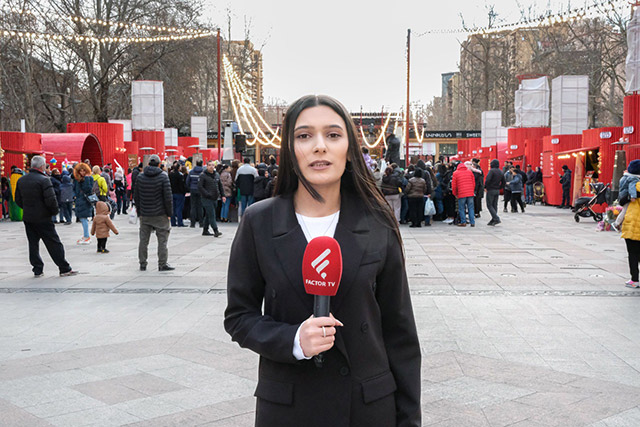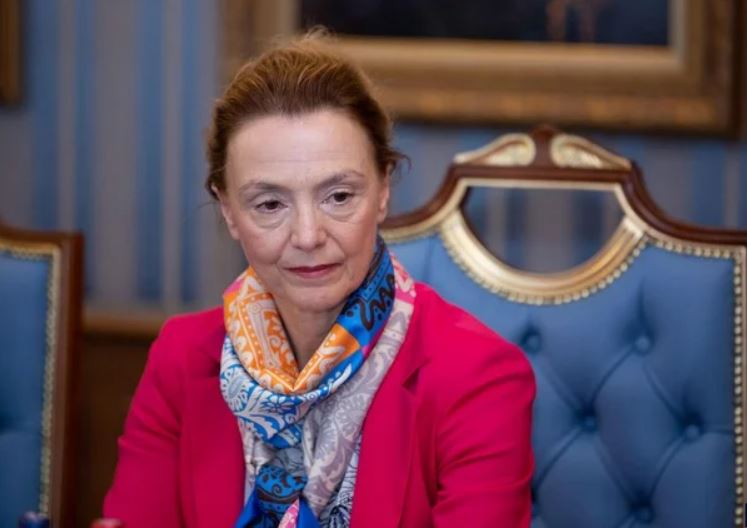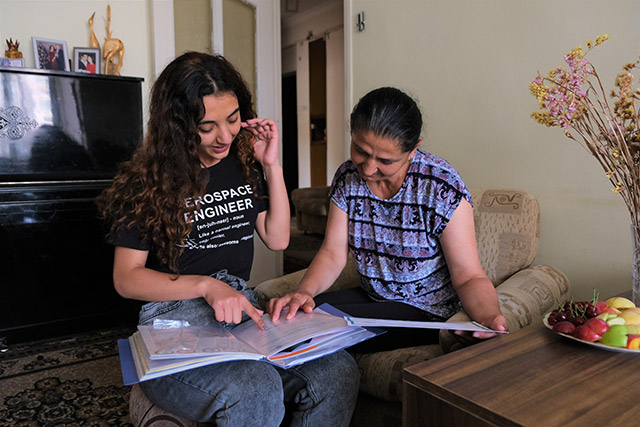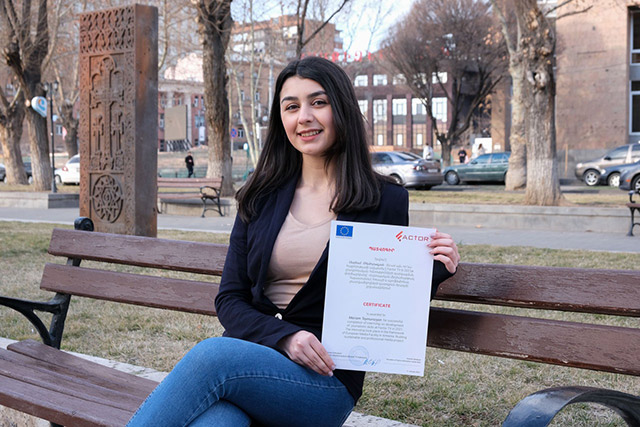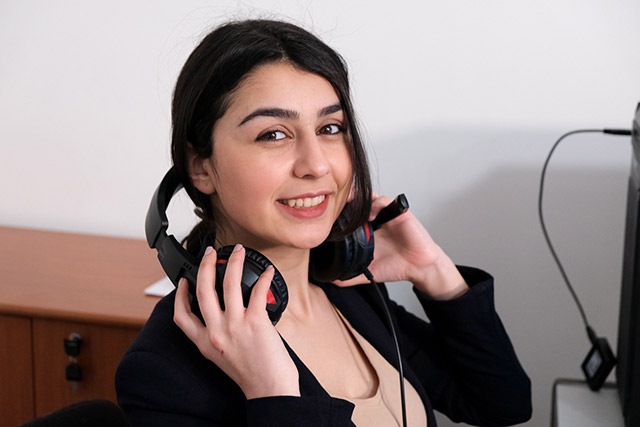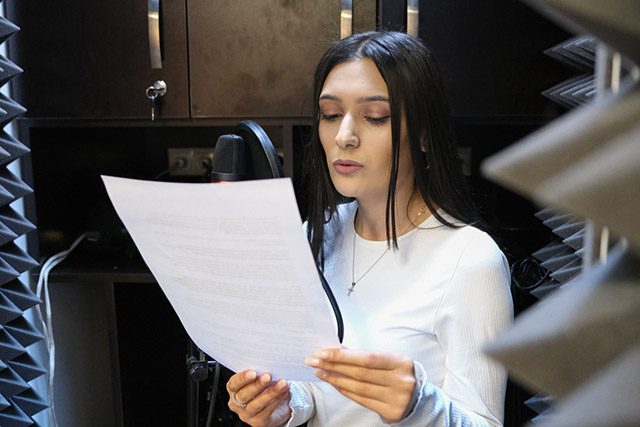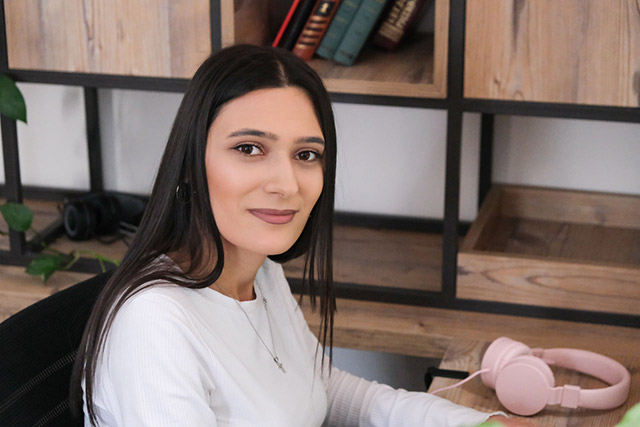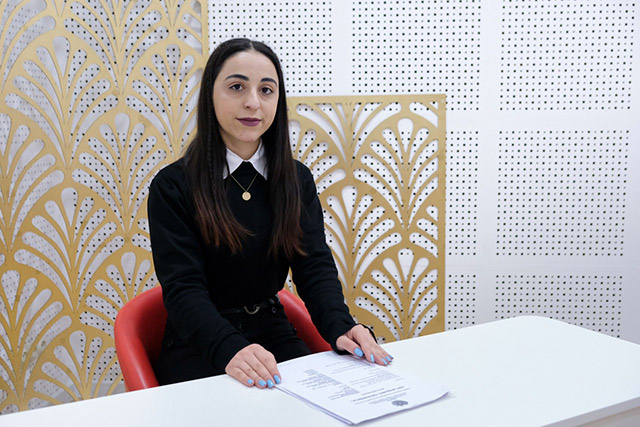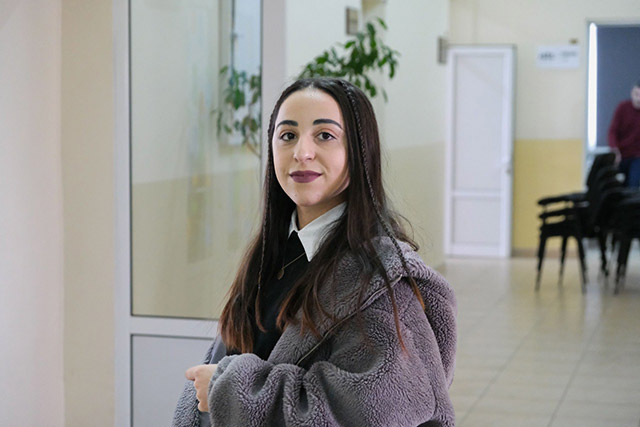Journalism is an attractive field for many students in Armenia. Many young people grow up watching the presenters behind the screen, and imagine their future on TV, but few realise the challenges of the profession. Armenian universities, in turn, mainly provide students with theoretical knowledge, but there is almost no opportunity to practice that knowledge.
The EU-funded “European Media Facility in Armenia – Building Sustainable and Professional Media” project is a good opportunity for journalism students. It is implemented by Deutsche Welle Academy in cooperation with BBC Media Action, OSF-Armenia, Investigative Journalists NGO (Hetq.am) and Factor Information Centre. Within the scope of the project, graduate students in journalism get the opportunity to improve their knowledge and skills. The courses consist of two parts: 12 participants get the chance to participate in online courses with BBC journalists, and six of them are then provided with the opportunity to use the knowledge gained with work experience on Armenian online broadcaster Factor TV.
The students continue their learning at Factor TV, participate in editorial activities together with the journalists, and prepare three materials independently. At the end of the project, the best three materials prepared during the probationary period are selected, and the winners announced.
“I had absolutely no idea where I would end up”
Read also
Mariam Teymurazyan, a 20-year-old third-year student at Yerevan State University, has come a long way from her home village of Vazashen in the Tavush region of Armenia. She chose journalism when she was a teenager.
“Everyone told me that journalism is my calling,” Mariam recalls, adding that Factor TV staff had held a meeting with students at Yerevan State University, during which she decided that she should definitely try her hand.
“I filled out the questionnaire, and the answer came in a few days. I wasn’t sure if I would be in the list of 12 selected participants, but I remember my happiness when seeing my name there,” says Mariam, noting that the main focus of the online courses was on visualisation: BBC journalists teach the students to build up their material in such a way that different, unique content is created, and so that the reader does not get bored.
Some of Mariam’s fellow students had also interned at Factor TV, and she had heard a lot about the media. At the end of the online course, she too was chosen to spend a three-month probationary period there: “The experience is very different from the theory that we learn in university. It’s very different when you’re working on an article – you don’t go out of your comfort zone: you interview your friends and people you know and do not take risks. But here, at Factor, you can take that risk, because you know there is a person behind you that you can turn to, and he or she will explain everything to you. Certainly, there is support at university, but it’s a bit different, because you don’t have any practice there.”
Mariam remembers her first day at Factor TV, how she met the editor, journalists and other employees. But she is more impressed by her first visit to the news booth and newsroom. “It’s a completely different feeling when you step into a newsroom where you will work. In fact, we worked in another room outside the newsroom, but all the conditions were created for us. It was really interesting to appear in the newsroom. When the editor says that you should sit in one place during the live, then in another place the material of one of the journalists is being discussed, while another journalist is preparing to leave for an interview. And when you are engaged in all this process, you also go with them, run with them, participate with them. It is a completely different experience.”
Mariam’s excitement was accompanied by fear, especially when she was receiving assignments from the editor. Initially, she was timid to call various officials and ask questions, but she overcame this anxiety too. “I had absolutely no idea where I would end up. I thought I would sit in the frame, read the text and leave. And now I realised that the reality is different.”
During the probation, the participants had to prepare three materials: text, video and studio interview. “It is a completely different situation when you do an interview in the studio. You feel even more responsibility, because it is not only your job, but also the people behind the cameras.”
Mariam has since tried to pass on the knowledge and skills gained during the project to her fellow students. “Life before the project – you’re an ordinary 18-19-year-old girl who knows about journalism, goes to university, writes articles about her friends, doesn’t take any serious steps. And after the projoect – you are already moving forward with clear steps, you are learning to be independent, to be a journalist. You understand that you are a journalist who has a name and you must do everything to keep that name high.”
“You are silver-tongued, you will become a journalist”
21-year-old Arpine Hakobyan from Akunk village, Gegharkunik region, has been interested in journalism since childhood. Everyone said she was eloquent, so she would become a journalist. And thus, from the 5th or 6th grade, she decided to become a journalist with the ambition of appearing on TV. Arpine therefore decided to enter the Department of Journalism of Yerevan State University.
“When I was a child, I thought that there’s nothing difficult to be a journalist: you just have to sit down, read your text, and that’s it. But now I realise how much time you spend on the material, if you want it to be of good quality,” says Arpine.
While studying, Arpine started reporting for various media outlets. At that point, she realised that she was on the right track in her profession. And when this project came up, Arpine was keen to seize the opportunity.
During her probation, Arpine hosted a live broadcast, which she described as the most nerve-racking moment of her life. She had been well prepared for the live broadcast, but for various reasons the events had been postponed, and for the first time she went live impromptu. At that moment she was encouraged by the cameraman working with her. “They used to say at University that a journalist has no personal life and should be available at any time, and even after the end of the working day you can’t say ‘That’s it, my work is over, I go home.’ During the probation I realised that it was true.”
Arpine’s story about air raid shelters was one of the winners of the project. She had worked on the material both in the capital Yerevan and in the city of Vardenis, Gegharkunik region. However, she didn’t expect that her name would be announced during the event. “I was sitting at the graduation event and checking my phone when Aram Abramyan took the first card to announce the names and read my name – Arpine Hakobyan. I honestly did not expect it and was shocked. I can’t remember how I found myself on the stage. You think that your material is good, you have worked a lot on it and have put it a lot of effort. I didn’t rule out that one of my materials would win, but on the other hand, the other materials were also good. That’s why it was so unexpected.”
Arpine presented her prize, a phone, to her mother, who had initially advised her to become a teacher, since she was sure it would be difficult for a girl to find a job in journalism. But now, in addition to the award, Arpine received a job offer from Factor TV. Now Arpine assists other students of the project. “I am their peer, and many of them know me from university and are not shy to ask for advice. The fact that now they come and learn, as I did before, is really inspiring for me.
“Wherever I go, I will be more confident”
Knarik Vardanyan from the village of Musayelyan in the Shirak region did not think about becoming a journalist at all. For a long time she couldn’t decide on a profession, and given her outgoing personality, chose journalism during her last year at school.
“Journalists are the fourth power, which means you can make a change. Secondly, I want to try everything, and journalism gives me that opportunity. You also get a chance to be very active, to communicate with different people,” says Knarik, noting that at first she imagined that she would host programmes, but while studying she understood that this is a completely different profession. “Until now, I have not decided in which field I want to work. I am currently working in the field of human rights. But I strive for visualisation and TV.”
Knarik missed the first opportunity to apply for the project, thinking that it might interfere with her classes. But when she heard the feedback from her fellow students about the project, she decided to try. “You can get experience here, that’s why I decided to apply for the second cohort. And I got into the project. During the online courses, I learned what steps one needs to take to get a quality report or interview. And now I try to use the knowledge I gained in my work routine.”
Knarik says the most difficult step is the first one – when you have theoretical knowledge but don’t know how to use it. Knarik took that first step during the probation; now she says that wherever she goes, she will be more confident.
She remembers that she was perturbed when she first had to meet face to face with an official to prepare a report. In that case she had the support of other journalists, whose presence gave her confidence. “At first it was difficult, but then, as I gained more experience, everything settled down, I gained confidence and had no other problems.”
Knarik was impressed by the intense daily life of journalists, when they work on an article without having finished another one. “We went with one of the journalists to cover a meeting. There I realised that I could not prepare political materials. Of course, being at the centre of events is impressive, but I realised that this is not my thing. I also realised that it is very difficult to hide emotions, to do your job without emotions.”
During the probation Knarik realised that so-called daily journalism was not her thing. “I loved the studio interview format. I did my first one at Factor TV and realiaed that I can work with a camera. I think I will be involved in similar projects in the future, dealing with people and cameras.”
One of the three materials prepared by Knarik was among the winners. “I honestly had a feeling that one of my materials would win. It was not a surprise to me. But I was very happy.” Like Arpine, Knarik not only won a prize but was offered a job at the end of her probation.
The project therefore not only gives the journalism students the opportunity to gain practical knowledge, but also to share their experience and knowledge with their fellow students. It also enables students to find real work in the Armenian media and apply their knowledge as professional journalists.
The programme is ongoing and the application process is currently open to third- and fourth-year students who want to develop their storytelling skills. The project consists of two parts: online courses with BBC journalists, and a three-month probation at Factor TV.
Author: Ami Chichakyan
This article was produced in the framework of the ‘EU NEIGHBOURS east’ project. The views expressed are solely those of the author of the article.




















































